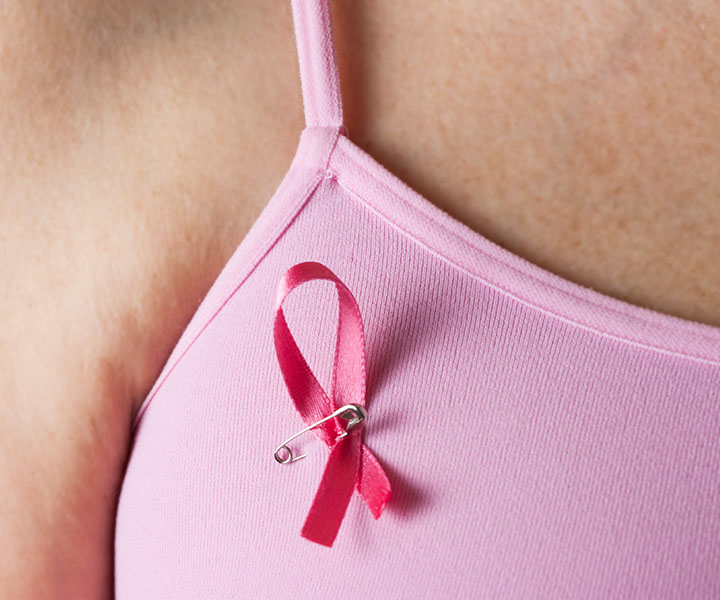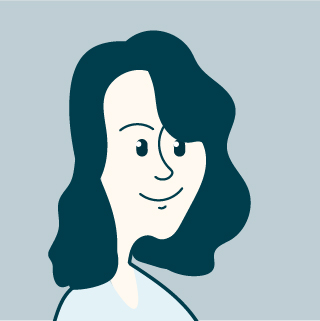Breast cancer: young women are more and more affected
11 March 2024 | Comment(s) |
Emma Raposo

Every year, some 6,500 women in Switzerland are affected by breast cancer, the majority of them over the age of 50. While the number of cases is rising in all age groups, the trend is more significant among younger women.
The number of people with breast cancer is rising throughout Europe. In Switzerland, a study conducted on 60% of the population revealed a slight increase in the incidence of breast cancer between 1996 and 2009 among women aged up to 49. The increase was greater among women aged 20 to 39. So what exactly is breast cancer?
According to the World Health Organisation, breast cancer is a disease caused by the uncontrolled growth of abnormal breast cells that then go on to form tumours. These cancerous breast cells begin in the milk ducts and/or lobules that produce milk. The characteristic symptoms are:
- a lump in the breast
- a change in the skin, an orange peel appearance, redness
- heat localised to an area
- pain in the area
- discharge from the nipple
- deformation of the breast
One of the distinctive features of breast cancer is its great variability, characterised by various parameters at the time of diagnosis, such as the size and nature of the cells that make up the disease. These characteristics can differ from one woman to the next, and this requires treatment specific to each woman.
Why is breast cancer striking earlier and earlier?

Breast cancer accounts for 33% of all cancers in women. The proportion rises to 40% in young women. The rise in the number of cases at all ages can be explained in part by the increase in screening and ever more accurate diagnoses. But why is cancer occurring earlier?
There is no single answer, as many factors are involved. Excessive alcohol consumption and lack of exercise, factors already identified in older women, play a role. Factors linked to a woman's reproductive history must also be taken into account: the greater the number of menstrual cycles, the greater the likelihood of developing cancer. It's not often talked about, but breastfeeding is a protective factor against breast cancer, as is early pregnancy. A woman who gives birth before the age of 20 is half as likely to develop breast cancer. Finally, contraception is an aggravating factor. Taking the pill increases the risk of developing breast cancer by around 20%.
As for endocrine disrupters, although the issue is still open to debate, and despite the fact that there is no reliable scientific data to back it up, many researchers recommend caution when it comes to these chemicals, which are thought to play a part in the development of a number of diseases. Take bisphenols, for example: scientists advise pregnant or breast-feeding women not to use certain plastics that may contain them.
Should we be screening at an earlier age?
Pre-menopausal cancers have two characteristics: they often lead to a later diagnosis, giving the disease time to spread and affect more lymph nodes. What’s more, the tumours are more aggressive and require more extensive treatment.
This raises the question of screening at an earlier age. While some countries, such as Sweden, have introduced screening from the age of 40, in Switzerland screening begins at the age of 50, with a mammogram recommended every two years. In cantons with screening programmes, this screening examination is reimbursed at 90% of the costs, excluding the deductible. But not all Swiss women are equal in this respect, as some cantons do not offer such programmes. With our PrimaFlex basic insurance, your screening test is covered, regardless of your canton of residence, and without having to pay your deductible.
However, between those in favour of early screening and those against, who believe that young women's breasts are too dense for mammograms to be truly effective, there may be a solution that meets everyone's expectations. An international study called MyPeBs, which was launched in 2019 and involved some 53,000 volunteers aged between 40 and 74, aims to compare an individualised risk-based screening strategy with the standard strategy. In this survey, a number of examinations (history-taking, mammograms, saliva tests) are carried out to determine each patient's five-year risk of developing cancer. The lower the risk, the less frequent the check-ups, the higher the risk, the more frequent the check-ups. The conclusions of this study could provide a response to the needs of each woman, making it possible to avoid unnecessary check-ups and better screen those at risk.

Prevention advice
The good news is that mortality rates have fallen. Switzerland is even one of the countries with the best prognosis: 88% survival at five years, all age groups combined, according to figures from the Swiss Cancer League. So what can you do on a day-to-day basis to prevent breast cancer? Here are a few tips to keep in mind:
- Maintaining a healthy lifestyle is essential. To put it simply, avoid smoking, moderate your intake of alcohol, take part in sports and eat a balanced diet.
- Carry out regular check-ups with your gynaecologist and don't hesitate to tell the doctor about risk factors such as family history.
- Carry out regular breast self-examinations from the age of 20 to help detect any abnormalities that may appear over the years.





